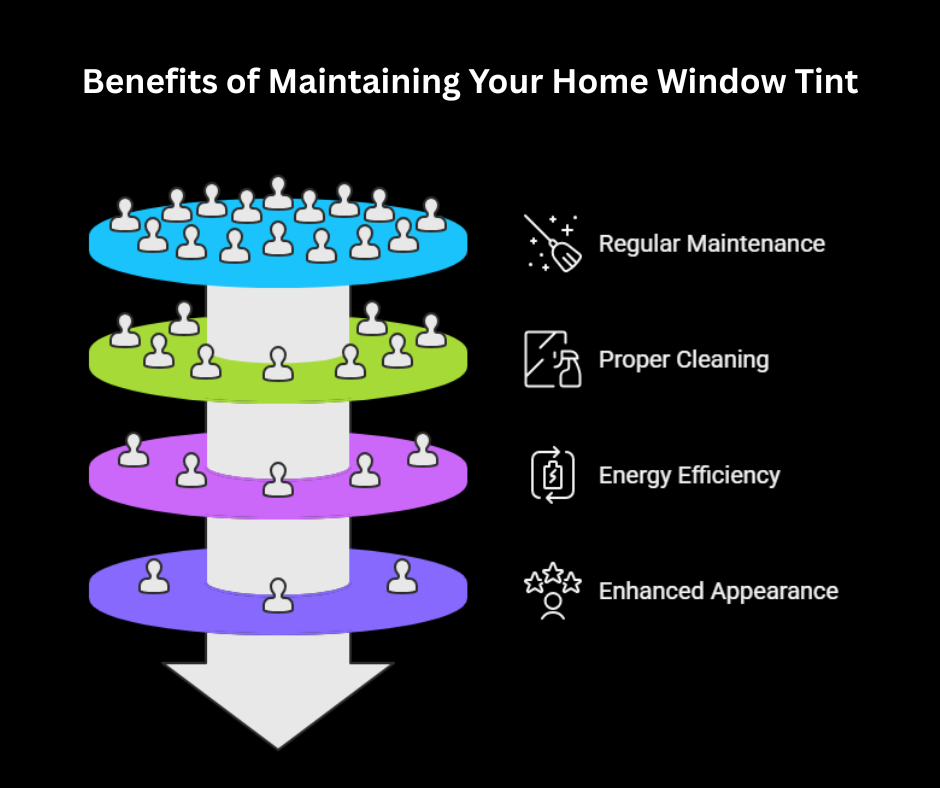Window tinting is one of the simplest and most effective ways to enhance your home’s comfort, appearance, and energy efficiency. It helps reduce glare, blocks harmful UV rays, lowers indoor temperatures, and protects furniture and flooring from fading. However, to enjoy these benefits for years, your window film needs a little care and attention.
Like any long-term home investment, proper maintenance plays a huge role in keeping your home window tint looking new and performing at its best. Whether you’ve just had your windows tinted or are looking to extend the life of your existing film, following a few smart practices can make all the difference.
Benefits of Maintaining Your Home Window Tint

1. Longer Lifespan
High-quality window films can last for many years, but regular maintenance ensures they stay free of peeling, bubbling, or discoloration. Gentle cleaning and mindful care can easily add years to your tint’s lifespan, protecting your initial investment.
2. Clearer Visibility
Dust, fingerprints, and residue can make tinted window film for homes look dull over time. Cleaning your tint properly keeps it spotless and streak-free, helping you maintain that clear view and polished appearance.
3. Energy Efficiency
A well-maintained tint continues to block out heat effectively, which reduces strain on your air conditioning system. This consistent performance translates to lower energy bills and a cooler indoor environment all year long.
4. Enhanced Appearance
Faded or scratched home window tint film can make even the most beautiful home look neglected. With proper care, your tint retains its sleek finish and professional look, complementing your home’s overall style.
5. Saves Money on Repairs
Neglecting your window film can lead to early wear, forcing premature replacement. Regular cleaning and inspections are inexpensive ways to prevent costly repairs or reinstallation later on.
How to Maintain Your Home Window Tint for Years

1. Understand Your Window Tint Type
Before you start cleaning or maintaining your tint, it’s important to know what type you have. Different window tinting for homes, such as dyed, metalized, ceramic, or 3M window films, may require specific care methods. For instance, some tints are more sensitive to certain cleaning agents or tools. Ask your installer for details about your film’s material and warranty requirements so you can follow the right maintenance routine.
2. Give It Time to Cure
After installation, your home window tint needs time to fully cure. This process usually takes between 3 to 4 weeks, depending on the weather. During this period, avoid cleaning or touching the film. Small bubbles or a hazy appearance are completely normal and will disappear as the adhesive sets. Patience at this stage ensures a smooth, long-lasting finish.
3. Clean with Care
When it’s time to clean your tinted windows, avoid harsh chemicals or ammonia-based cleaners, as they can damage the film. Instead, use a mild, ammonia-free glass cleaner or a simple DIY mix, just a few drops of baby shampoo or dish soap in water.
Use a soft microfiber cloth or rubber squeegee to gently clean and dry the surface. Never use paper towels, abrasive sponges, or sharp objects, as these can leave scratches on the household window tint film. Regular gentle cleaning keeps your film clear, bright, and free from residue buildup.
4. Avoid Sharp or Rough Objects Near Windows
It’s easy to forget that certain household items can harm your tint. Furniture edges, pet claws, or even decorations placed too close to the glass can cause scratches or tears. Try to keep sharp or rough items away from the tinted surface. If you have pets, consider using protective barriers or rearranging furniture to reduce accidental contact.
5. Be Mindful of Sun Exposure and Heat
While door window tints are designed to withstand sunlight, prolonged exposure to intense heat can affect their longevity. If possible, use curtains or blinds during the hottest parts of the day, especially for windows facing direct sunlight. This simple habit can help preserve your film’s color and effectiveness for years.
6. Schedule Regular Inspections
Make it a habit to inspect your tinted windows every few months. Look for signs like peeling edges, bubbling, or discoloration. Spotting these early allows you to take corrective action before the problem spreads. Most reputable installers, including All Spec Sun Control, offer professional inspections or maintenance advice if you’re unsure about your film’s condition.
7. Work with Trusted Professionals
Professional installation and maintenance are key to ensuring your indoor window tint lasts as long as possible. Experts use high-quality materials and precise application methods, which minimize issues like bubbling or uneven adhesion. Plus, reputable providers offer warranties that cover product and workmanship quality.
If you ever notice persistent damage or need to replace an old film, reach out to your installer rather than attempting DIY fixes. Professionals have the tools and expertise to safely remove or replace window films without damaging the glass underneath.
Final Thoughts
Tinting residential windows is a smart investment that adds comfort, beauty, and protection to your space. By understanding how to care for it properly, you’ll not only extend its life but also continue enjoying its full benefits, reduced heat, lower energy bills, UV protection, and enhanced privacy.
A few simple habits, gentle cleaning, regular inspections, and mindful care, go a long way in preserving the look and performance of your window film.
And if you ever need expert guidance, maintenance, or a fresh installation of UV window film, the professionals at All Spec Sun Control are here to help. Schedule a consultation today!
FAQ’s
1. How often should I clean my home window tint?
Clean your tinted windows once every few weeks or as needed. Use a soft microfiber cloth and an ammonia-free cleaner to remove dust and smudges without damaging the film.
2. Can I use regular glass cleaner on tinted windows?
It’s best to avoid regular glass cleaners that contain ammonia, as they can discolor or weaken the tint. Always opt for ammonia-free or mild soap-based solutions.
3. How long does home window tint typically last?
With proper care, high-quality films like 3M security window film can last anywhere from 10 to 20 years. Factors such as film quality, installation technique, and environmental conditions affect lifespan.
4. What are the signs that my window tint needs replacement?
Peeling edges, bubbling, discoloration, or a hazy appearance that doesn’t fade after cleaning are signs your film may need to be replaced. Professional inspection can confirm whether repair or reapplication is needed.

